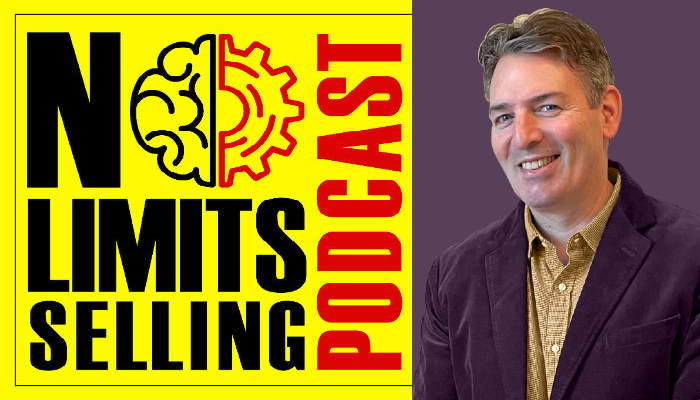4 Tactics to Build an Effective Sales Process
On Episode 207 of The No Limits Selling Podcast, we have David Masover, Founder at The Sales Team Success System. David Masover is an author, speaker, and thought leader in the B2B sales space. For over 30 years he has worked in large and small sales organizations in positions from sales rep to executive, and this has allowed him to refine and perfect the innovative and effective B2B sales and sales management techniques and strategies he teaches today.
David was one of the co-founders of Branders.com in 1999 (acquired by Bel USA), the world's first and at one time largest online platform for customized promotional products. David now works as a private practice sales consultant.
David is the author of three books on sales process, a prolific content creator on LinkedIn, the host of The Sales Team Success Formula™ podcast, and is a self described sales and sales process geek.

Contact David:
[EDITOR’S NOTE: This podcast is sponsored by No Limits Selling. It is a fun, fast-paced podcast that delivers hard-fought business advice that you can implement today to improve your sales and performance]
Interested In Our Real Estate Coaching Services? Explore Our Website: Link
Feeling Not Well Today? You Can Use Our Mindset Boosters App To amp Up Your Mood: Link
Find us on Social Media:
LinkedIn | Facebook community | Instagram
Like what do you listen to? Subscribe to our podcast!
Ready to become fearless? We can help you become fearless in 60 days so you accomplish more in your career Schedule A 15 min Call with Umar
Summary
Introduction and Background
The podcast begins with Umar Hameed introducing David Masover, an author, speaker, and thought leader in the B2B sales space. David shares his journey into sales, explaining that he initially got into the field with the aim of making a lot of money. However, he soon realized that the key to success in sales was not just about making money, but about helping customers.
The Importance of a Sales Process
David emphasizes the importance of having a sales process. He likens a sales process to a roadmap that guides salespeople through the sales cycle. He also notes that a good sales process should be flexible and adaptable to different situations.
Selling to Value
The conversation then shifts to the concept of "selling to value". David explains that selling to value means understanding what the customer values and aligning your product or service to meet those values. He argues that this approach is more effective than selling based on price or features.
Sales Training
David discusses the importance of sales training. He believes that sales training should be ongoing and not just a one-time event. He also emphasizes that sales training should be practical and relevant to the salesperson's job.
Advice to Salespeople
Towards the end of the podcast, David offers some advice to salespeople. He encourages salespeople to always be learning and improving. He also advises salespeople to be persistent and not give up when faced with challenges.
Conclusion
In this podcast, David Masover, a renowned author and sales consultant, shares his insights on improving sales performance. He emphasizes the importance of a well-structured sales process, which he likens to a roadmap guiding salespeople through various customer interactions. Masover advocates for a customer-centric approach, focusing on understanding and aligning with the customer's values rather than merely pushing products based on price or features. He also underscores the significance of continuous, practical sales training, which should be relevant to the salesperson's role.
Offering advice to salespeople, Masover encourages continuous learning, improvement, and persistence in the face of challenges. Overall, the podcast provides valuable insights into the sales process, the role of value in selling, and the importance of ongoing sales training.
Questions & Answers
What is the importance of a sales process according to David Masover?
What does 'selling to value' mean in sales?
How important is sales training according to David Masover?
What advice does David Masover give to salespeople?
Who is David Masover and what is his contribution to the sales industry?
Don’t miss this opportunity to transform your real estate career with one-on-one coaching. As an experienced real estate coach, I, Umar Hameed, am dedicated to helping you unlock your full potential and achieve your real estate goals. To learn more about who am I and my clients ↓
If you’re ready to take the next step, book an appointment with me today and begin your journey toward success in the real estate industry.
